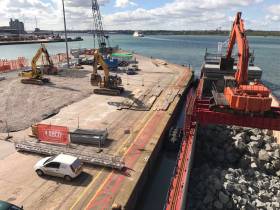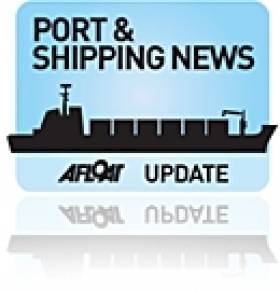Displaying items by tag: Abco Marine
#PortProject - A Northern Ireland based marine civil engineering firm, ABCO Marine have been contracted to work on a project located in Portsmouth.
The contract to the Lisburn firm is from Galliford Try for the construction of Fort Cumberland SST Sea Defences. The project involves replacing damaged sea defences next to the historical Fort Cumberland site in Eastney, Portsmouth.
Southern Water are taking the steps, to protect Fort Cumberland and three of their underground storm tanks, which are vital in helping to prevent flooding in the city of Portsmouth. The storm tanks and combined sewer outfall are an essential part of the catchment – and help to protect the city from sewer flooding during heavy rainfall.
ABCO sourced and procured the rock for the project, with vessels chartered to transport the rock armour from Norway for offloading within Southampton Port where the rock is temporary stockpiled. The rock is then loaded onto cargo barges for marine tow and landing on Fort Cumberland beach, with the barges safely landed on a high tide operation. At low tide, the rock armour is unloaded and stockpiled on the beach in advance of the final rock revetment construction.
Last month ABCO began to mobilise the site which is programmed to be completed and handover in September 2017. Commenting on the contract, John Osborne, ABCO Marine Ltd Director, commented, "The Fort Cumberland Sea Defence project has taken months of planning and communications with both stakeholders and suppliers, all brought together to support the construction phase of the sea defence at Fort Cumberland.
Southampton Port and with special assistance by Langstone Harbour for pilotage have supported ABCO for the beach landing of the rock cargo barges. We are currently mobilising the final plant items to support the rock revetment construction phase, which we hope to have completed to programme. ABCO are delighted to be associated with Galliford Try and Southern Water to deliver the sea defence works".
#FORMER DUNDALK DREDGER – Hebble Sand (1963/757grt), a grab-hopper dredger which has remained in Dublin Port for more than one year departed Dublin Port and is currently heading for Campbeltown, on the Mull of Kintyre Peninsula, writes Jehan Ashmore.
As previously reported on Afloat.ie, the veteran vessel was purchased last October by Northern Ireland based Abco Marine Ltd. The marine-plant and engineering equipment company is headquartered in Lisburn. Prior to then the former Dundalk Port Company owned dredger had remained laid-up since her repositioning voyage from the Louth port in July of 2011.
The change of port, followed the transfer of the Dundalk Port Company assets, liabilities and operations to Dublin Port Company by an order of statutory instruments, which saw the capital port divest in the business of dredging.
Since then for the majority of her time spent in the port, she had moored in Alexandra Basin West, except for a short spell spent as reported at the nearby dry-dock facility after Abco brought the ship.
Yesterday she made the short passage across the basin to the river-berth alongside Ocean Pier in readiness for her first repositioning voyage under her new owners, in a career that has so far spanned just short of half a century.
This timeframe is pretty good going for a vessel, particularly engaged in the rough and tumble work of a humble dredger which remains in excellent condition. So her career continues and remarkably still retaining her original name since her launching from Richard (Shipbuilders) of Lowestoft who built her for British Dredging.
In this photo-link of the vessel in recent years, she is seen alongside Sir John Rogerson's Quay, Dublin Port, where she carried site preparatory work prior to the installation of the Samuel Beckett swing-bridge, which was towed on a barge from the Netherlands.
Note to the left of the small ship can be seen the gable-end of the last dockland warehouse sheds that were built on both sides of the campshires that line the Liffey, in an area now named the 'Docklands' quarter of the port.
With cargoships long gone, including the famous Guinness stout-tankers, the sheds historically represent the last such buildings in what was the 'real' docklands close to the inner-city.
One of the two-adjoining sheds (built in the 1880's) was occupied by BJ Marine and now the river-fronted 'Nama' property, formerly owned by the DDDA, have recently been placed on the market for sale or to let.

























































